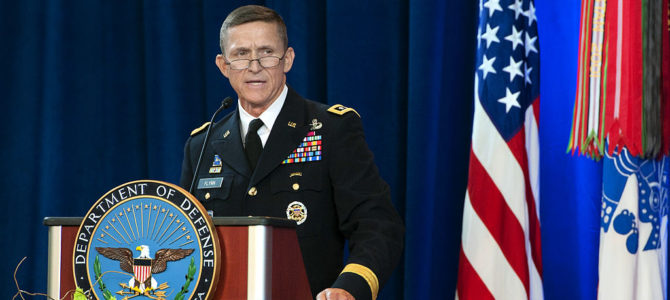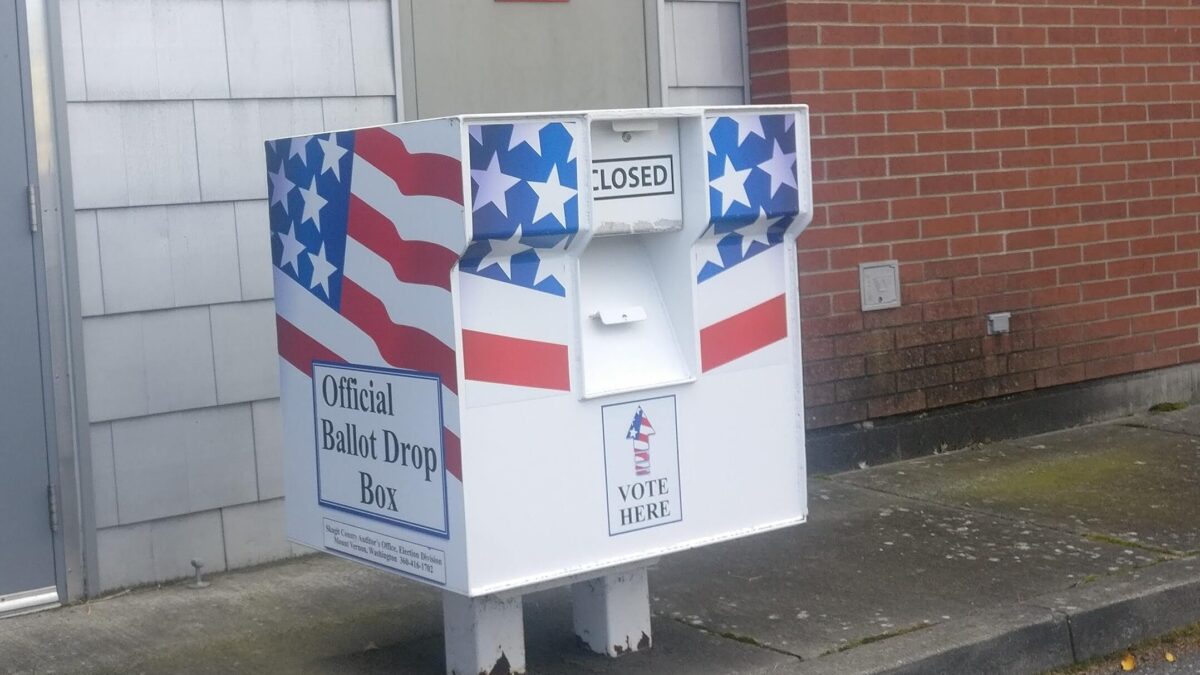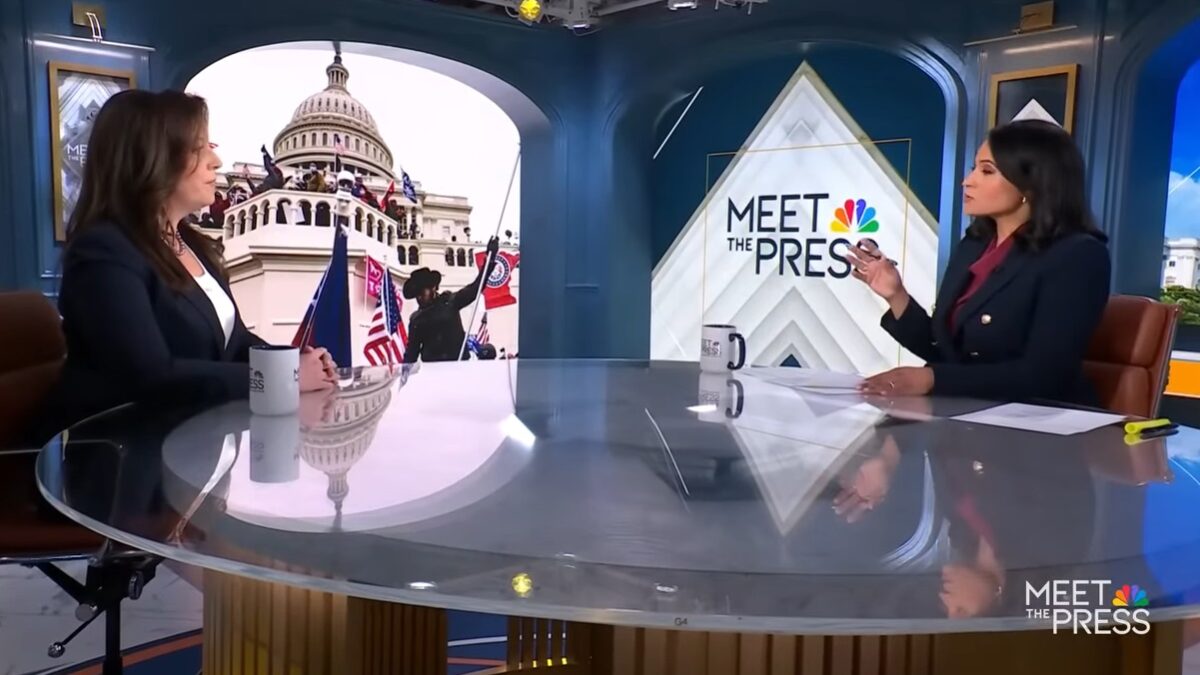
For the last year, the discussion of the Russia collusion hoax as it relates to Michael Flynn has focused on the criminal case against President Trump’s former national security advisor. Now, all eyes remain fixed on the D.C. Circuit Court of Appeals. Two weeks ago it heard, en banc, oral argument to decide whether to direct presiding Judge Emmet Sullivan to dismiss the criminal charge against Flynn.
To Flynn and his family, the criminal jeopardy he faced because of the perjury trap set by Obama administration holdovers is the most concerning. Reasonable Americans of goodwill should be horrified by the personal harm inflicted on the retired lieutenant general and his loved ones.
However, the criminal case is but half the scandal, and the mostly unexamined portion of the plot to force Flynn’s ouster from the Trump administration threatens a more lasting harm to our constitutional republic and the peaceful transition of power.
Political Opposition Sought to Decide a President’s Staff
That the Trump Resistance sought Flynn’s firing seems clear from the evidence. The day before then-FBI Agent Peter Strzok and his colleague Joe Pientka questioned Flynn about Flynn’s telephone conversations with the Russian ambassador, Sergey Kislyak, the Crossfire Hurricane team met to discuss the strategy.
On the morning of the interview, on January 24, 2017, Assistant Director of FBI Counterintelligence Bill Priestap apparently had second thoughts. “I believe we should rethink this,” notes from a follow-up meeting read. “What is our goal? Truth/Admission or to get him to lie so we can prosecute him or get him fired?”
It now appears the primary goal was the ouster of the newly appointed national security advisor. What is less clear, however, is who plotted this plan or knowingly participated in its execution.
A brief exchange between Attorney General William Barr and Fox News’ Mark Levin three Sundays ago suggested these lines of inquiry. About halfway through the hour-long interview, Levin asked the attorney general about the Flynn case. Barr explained how he had appointed U.S. Attorney Jeff Jensen to review the Flynn case after Flynn’s attorney, Sidney Powell, began accusing the Department of Justice of misconduct.
“Everyone who knew anything about that case thought it was hinky,” Barr explained. “It didn’t all add up,” he continued, “because the call, on its face”—referring to the late December 2016 call between Flynn and the Russian ambassador—“was a perfectly legitimate call for the incoming national security advisor to make.”
Jensen, whom Barr stressed had 10 years as an FBI agent then another ten years as a career prosecutor prior to his appointment as a U.S. attorney, “found a lot of things that had not come to light before.” “For example,” Barr continued, the evidence “showed clearly that the FBI agents who interviewed Flynn did not think he was lying.”
Significantly, Barr then added: “Now, this was later minimized in testimony as suggesting ‘Well, they meant he didn’t break out into sweat and his eye pupils didn’t contract, that’s all they were saying.’” “No,” Barr declared emphatically. “They were saying he didn’t believe he thought he was lying at the time.”
So, who stated in congressional testimony that the interviewing FBI agents, Pientka and Strzok, merely meant Flynn had not shown any indicia of lying? James Comey.
Comey Switches Testimony on Whether Flynn Lied
First, just a little more than a month after Pientka and Strzok interviewed Flynn, Comey testified before the House Permanent Select Committee on Intelligence. During his March 2, 2017 testimony, Comey stated, “I talked to them about this,” referring to their interview of Flynn, and “they discerned no physical indications of deception. They didn’t see any change in posture, in tone, in inflection, in eye contact. They saw nothing that indicated to them that he knew he was lying to them.” Comey added that after the interview, the agents “drafted a 302 and reported to me and the deputy director.”
Then on December 7, 2018, Comey testified before the House Committees on the Judiciary and Oversight. During that hearing, Comey was asked whether “either of those agents, or both,” had told him “they did not adduce an intent to deceive from their interview with General Flynn.” Comey said “no.”
Rep. Trey Gowdy then asked Comey what Pientka and Strzok had relayed back concerning Flynn’s intent to deceive. “My recollection was,” Comey stated, “the conclusion of the investigators was he was obviously lying, but they saw none of the normal common indicia of deception: that is hesitancy to answer, shifting in seat, sweating, all the things that you might associate with someone who is conscious and manifesting that they are being—they’re telling falsehoods. There’s no doubt he was lying, but that those indicators weren’t there” (emphasis added).
Comey added that he recalled telling the House Intelligence Committee earlier “that the agents observed none of the common indicia of lying — physical manifestations, changes in tone, changes in pace — that would indicate the person I’m interviewing knows they’re telling me stuff that ain’t true.” “They didn’t see that here,” Comey explained. Rather, “it was a natural conversation, answered fully their questions, didn’t avoid. That notwithstanding, they concluded he was lying,” Comey unequivocally affirmed.
When Comey told Congress that the FBI agents “concluded he was lying,” Flynn was on the cusp of being sentenced for supposedly lying to the FBI about his conversations with the Russian ambassador. Just three days prior, the special counsel’s office had filed its sentencing memorandum with the court, maintaining that because of Flynn’s “substantial assistance and other considerations set forth below, a sentence at the low end of the guideline range—including a sentence that does not impose a term of incarceration—is appropriate and warranted.” For all intents and purposes, the Flynn case was over.
But when Flynn appeared before Judge Sullivan for sentencing on December 18, 2018, the judge exploded, suggesting the retired lieutenant general had sold out his country and possibly committed treason. Sullivan then suggested Flynn might face jail time if sentencing proceeded. Flynn wisely agreed to delay the sentencing hearing. Then, six months later, Flynn fired the attorneys who had represented him during the Mueller investigation and hired Powell.
Evidence Comey Never Thought Would Surface
Powell immediately demanded the DOJ provide all material relevant to the case against Flynn. Little of significance was forthcoming, though, until Barr tasked Jensen with reviewing the case. Jensen later released several pieces of exculpatory material that Comey likely never expected would see the light of day when he testified before Congress that the agents concluded Flynn was lying.
That evidence included handwritten notes dated January 25, 2017, that stated the FBI assessed that yes, Flynn made false and inaccurate statements, “but believed that Flynn believes that what he said was true,” and that the FBI concluded that Flynn was “largely telling truth as he believed it.”
A typed “Draft Work Product” dated January 30, 2017 was even more explicit, stating that on January 25, 2017, the FBI had briefed the National Security Division and Office of Deputy Attorney General staff on their interview.” The “FBI advised that they believed Flynn believed what he was saying was true.”
Was Comey present for the debrief at which these notes were taken? Did he receive the Draft Work Product that stated the FBI “believed Flynn believed what he was saying was true?” And what, if anything, did Strzok, Pientka, or others tell Comey?
While in his first time testifying on the Hill, Comey noted he had spoken with the agents, during his follow-up testimony, Comey said while that was possible, his recollection was that he had “spoke[n] to people who had spoken to the investigators themselves.”
Here, the recently declassified 302 interview summary of the special counsel’s July 19, 2017, interview of Strzok provides some help. According to the 302, Strzok stated that following the interview of Flynn, he and Pientka “both had the impression at the time that Flynn was not lying or did not think he was lying.” Significantly, Strzok then told the special counsel’s office that after the interview, they “returned to FBI Headquarters and briefed [Andrew] McCabe and Baker on the interview. McCabe briefed Comey.”
So did McCabe mislead Comey, leading Comey to falsely testify that the FBI agents concluded Flynn “was lying?” Or did Comey know the truth based on his conversations with Strzok or Pientka, or reading the reports?
Comey and Yates Misinformed or Lying
These questions matter, and not merely because an affirmative to any of them would call into question the veracity of Comey’s congressional testimony. Rather, they also matter because someone (or many individuals) similarly misinformed Obama Deputy Attorney General Sally Yates: Yates apparently did not know that the agents who interviewed Flynn believed Flynn thought he was accurately recounting his conversations with the Russian ambassador.
Specifically, the 302 interview summary for Yates read: “Yates received a brief readout of the interview the night it happened, and a longer readout the following day. . . . Yates did not speak to the interviewing agents herself but understood from others that their assessment was that Flynn showed no ‘tells’ of lying and it was possible he really did not remember the substance of his calls with Kislyak. On the other hand, the DOJ prosecutors were very skeptical that Flynn would forget the discussion.”
The 302 summary of Yates’s interview further noted that Yates reiterated that, in hearing about the interview, “the DOJ prosecutors thought Flynn was lying, but the FBI didn’t say he wasn’t lying, just that he didn’t exhibit any ‘tells’ that he was lying.”
Yates’s 302 further noted that McCabe had discussed the FBI’s interview of Flynn with Yates. So, it would seem that McCabe also failed to tell Yates that the FBI agents did not think Flynn was lying. Given that Strzok and Pientka briefed McCabe after interviewing Flynn, it is inconceivable that they did not inform McCabe of their assessment that Flynn was not lying.
Did McCabe Lie, Or Did McCord, or Both?
But from declassified materials, it appears that it was not merely McCabe who failed to inform Yates of that important fact. Rather, Mary McCord, who served as the head of the DOJ’s National Security Division, appears to have likewise omitted this significant detail in briefing Yates.
McCord’s 302 stated that “following the Flynn interview, Priestap, Strzok, [Pientka], and FBI General Counsel went to the DOJ to brief them on the interview.” During this meeting, according to McCord’s 302 summary, “Strzok provided a readout of the Flynn interview, since he and another agent had conducted it.”
While McCord’s 302 statement was unclear on what exactly Strzok and Pientka told the DOJ representatives, declassified notes taken by Deputy Assistant Attorney General Tashina Gauhar reveal that during a read-out on January 25, 2017, Strzok and Pientka told McCord (and others) that the FBI assessed that “Flynn believes that what he said was true,” and was being forthright with the agents. The typed Draft Work Product also confirmed that during the January 25, 2017 briefing, the “FBI advised that they believed Flynn believed what he was saying was true.”
Yet it appears that McCord did not inform Yates of this significant fact because, as noted above, Yates’s 302 stated that Yates “did not speak to the interviewing agents herself but understood from others that their assessment was that Flynn showed no ‘tells’ of lying and it was possible he really did not remember the substance of his calls with Kislyak.” Significantly, Yates then said, “the DOJ prosecutors thought Flynn was lying, but the FBI didn’t say he wasn’t lying, just that he didn’t exhibit any ‘tells’ that he was lying.”
Not only did McCord apparently mislead Yates concerning the FBI agents’ assessment of Flynn’s veracity, according to Yates, McCord was “effectively ‘cross examining’ the statements Flynn made to the interviewing agents as compared to the transcripts.” But McCord did more than leave Yates uninformed or misled about the FBI agents’ view that Flynn had not lied: McCord inaccurately summarized the transcript of the calls between Flynn and the Russian ambassador for Yates.
According to McCord’s 302 summary, following Strzok and Pientka’s questioning of Flynn, “McCord reviewed the Flynn transcripts and pulled out excerpts for Yates to reference in the discussion with the White House Counsel’s Office, should they be necessary.” Then, on “January 26, 2017, McCord accompanied Yates to the White House, where they met with White House Counsel Don McGahn and another attorney from his office, James Burham.”
Another Lie: That Flynn Discussed Sanctions
McCord further stated, as summarized in the 302 summary, that Yates “told them that the conversations made it clear that there were discussions on Russian sanctions in those calls, contrary to what Vice President Pence had said on TV.”
But as all Americans (who don’t limit themselves to corporate media reporting) now know with the declassification of the transcripts of Flynn’s calls to Kisylak, Flynn did not discuss Russian sanctions with the Russian ambassador. So Flynn could not possibly have lied to the FBI or to Vice President Mike Pence about discussing sanctions with Kisylak.
So why did Yates think otherwise? Did McCord, who “reviewed the Flynn transcripts” and “pulled out excerpts for Yates” in preparation for the meeting, also mislead Yates about Flynn’s conversation with the ambassador? If so, was it intentional, or was McCord merely a victim of her own confirmation bias?
There is no doubt McCord held a bias: “When McCord left DOJ she was hired by House Intelligence Committee Chairman Adam Schiff, serving ‘front and center’ in the whistleblower fraud run by Schiff that later led to the failed attempt to impeach president Trump.”
Intentional or not, Yates regurgitated the false claim to McGahn that Flynn had discussed sanctions with Kisylak and then implied that Flynn had lied to Pence about his conversations with the Russian ambassador. President Trump, believing Flynn had lied to the vice president, then fired Flynn, which was clearly the goal.
Another Tell in Comey’s Testimony
Comey unwittingly gave away the game when he testified before Congress that nothing had happened after President Obama raised Flynn’s conversation with the Russian ambassador during a January 5, 2017 Oval Office meeting also attended by Yates. Comey testified that the following day he had briefed Yates on the calls, and then “nothing, to my mind, happens until the 13th of January, when David Ignatius publishes a column that contains a reference to communications Michael Flynn had with the Russians.”
The reason “nothing happened” was because there was nothing wrong with Flynn’s calls. They were “legitimate,” as Comey put it at the time. It was the illegal leak of the classified intel to Ignatius of Flynn’s conversation with Kislyak that threatened Flynn’s position in the White House, and then only because the FBI questioned Flynn instead of asking him about the transcripts, or sharing the transcripts with the White House to allow the Trump administration to broach the issue with Flynn.
Flynn’s fate, however, was sealed when Yates conveyed to the White House that Flynn had lied to Pence and had been questioned by the FBI. Even then, had Yates conveyed the truth—that the agents believed Flynn had not lied—the Trump administration might have resolved the situation differently.
Instead, though, Obama administration holdovers and partisan career employees succeeded in causing the ouster of the new administration’s pick for national security advisor. And that plot only succeeded because of illegally leaked classified intel. These facts shake the foundation of our constitutional republic and threaten the peaceful transitions of power, and will be a blot on our country’s history long after Flynn obtains some semblance of justice.
Further, the targeting of Flynn was but one thread of the Obama-Biden administration’s attempt to interfere with the Trump administration. The spying on the transition team, the failure to provide Trump defensive briefings, the attempt to sidestep Trump’s attorneys general—successful with Jeff Sessions, but not Barr—and the weaponization of whistleblowing laws to impeach the duly elected president represent the most destructive attack on our government ever.
Come November 2020, Americans should make clear that such interference in their freely chosen commander-in-chief will not profit.









